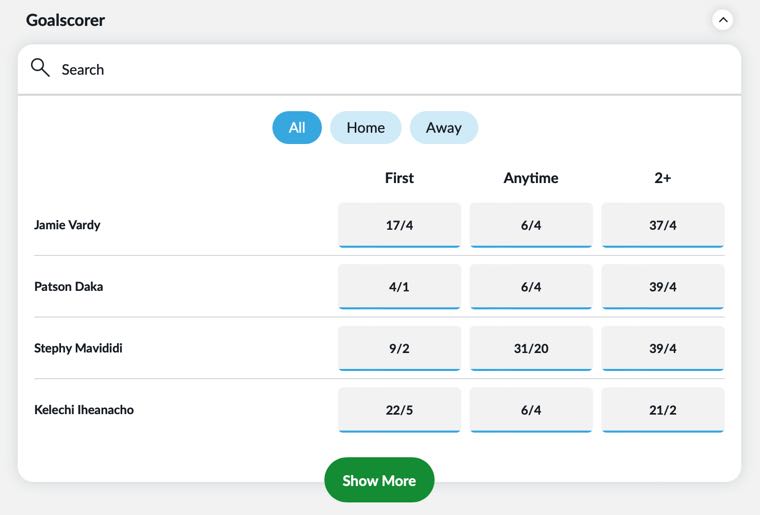 When it comes to betting on goalscorers in football matches, there are numerous choices in front of you. You can, for example, read about placing a wager on the Anytime Goalscorer market elsewhere on this site. One of the most simplistic bets to understand is the First Goalscorer wager, which is often expressed as FGS. It is, as the name suggests, a bet on the player who scores the first goal in a game, but there are certain things that can have an impact on the outcome of the wager. If an own goal is scored, for example, then it doesn’t count, as we’ll explain in more detail. Similarly, only goals scored in 90 minutes count towards the bet.
When it comes to betting on goalscorers in football matches, there are numerous choices in front of you. You can, for example, read about placing a wager on the Anytime Goalscorer market elsewhere on this site. One of the most simplistic bets to understand is the First Goalscorer wager, which is often expressed as FGS. It is, as the name suggests, a bet on the player who scores the first goal in a game, but there are certain things that can have an impact on the outcome of the wager. If an own goal is scored, for example, then it doesn’t count, as we’ll explain in more detail. Similarly, only goals scored in 90 minutes count towards the bet.
What You’re Betting On
If you choose to place a First Goalscorer bet, you are placing a wager on the player from either team that scores the first goal of the game that isn’t an own goal. If there is a team that is seen as stronger than the side that they’re facing, the likelihood is that their players will have lower odds to score than the players of the team that is perceived as being weaker. As an example, here is a look at some of the FGS odds for Liverpool players when they played Sheffield United at home during the 2023-2024 season:
| Player | First Goalscorer Odds |
|---|---|
| Mohamed Salah | 3/1 |
| Darwin Núñez | 7/2 |
| Cody Gakpo | 9/2 |
| Jayden Danns | 9/2 |
| Luis Diaz | 11/2 |
| Virgil van Dijk | 14/1 |
Conversely, here is a look at the odds for some of Sheffield United’s player’s to score the first goal of the game:
| Player | First Goalscorer Odds |
|---|---|
| Cameron Archer | 14/1 |
| Ben Brereton | 16/1 |
| Oliver McBurnie | 18/1 |
| William Osula | 18/1 |
| Gustavo Hamer | 22/1 |
You can see that the bookmaker thought it was just as likely that Liverpool’s centre-back, Virgil van Dijk, would score the opening goal of the game as the forward of Sheffield United, Cameron Archer. That tells you that the Merseyside club were firm favourites for the game.
Things to Think About

One of the main things to think about in terms of the First Goalscorer bet is what does and what doesn’t count towards the outcome of the wager. That is to say, you can place a bet on a player being the first one to score a goal in a game and see them score the second but win your bet, whilst also see them score the first goal and lose your bet. That is because own goals do not count towards the outcome of First Goalscorer bets and neither do goals scored in extra-time or a penalty shootout. In other words, in the Liverpool match, Luis Diaz could score an own goal but FGS bets on him won’t pay out because it wasn’t a goal for his team.
If Virgil van Dijk were then do go and score the equaliser, bets on him as the First Goalscorer would be paid out, even though it would’ve been the second goal of the game. In a similar manner, if it had been a cup game that had gone to extra-time and van Dijk had scored to make it 1-0 to Liverpool during the extra-time period, the bet would not be paid out on because First Goalscorer bets are for the 90 minutes of the game plus any stoppage time that the referee adds on before blowing the final whistle. They are key things to think about before placing your bet, as well as helpful things to know if you’re wondering why your bet has or hasn’t been a winner.
Weighing Up Who to Bet On
If you’re looking at the First Goalscorer market for a football match, you might feel a little overwhelmed by what’s in front of you. That is entirely understandable, given the huge number of moving parts that are involved in the outcome of a football game. The main thing that you need to do before you place your bet is plenty of research. For the majority of Europe’s big leagues, there are plenty of different places you can look to find a wealth of information about the teams that you’re likely to be betting on. This can be key because it allows you to know if there is anything that you should take into account, such as important players missing from a team.
You can also find out whether a player tends to score the opening goal a lot of the time. It is not out of the realms of the possible, for instance, that someone is the leading goalscorer for a side but rarely scores the opening goal of a game. You might look at their numbers alone without any research and decide to bet on them, but looking into things a little further would show you that betting on them as the First Goalscorer would be a mistake. Similarly, there might be a central defender who often scores the opening goals because the team that they play for specialise in set-pieces, but because they’re a defender they might have longer odds than the attackers.
